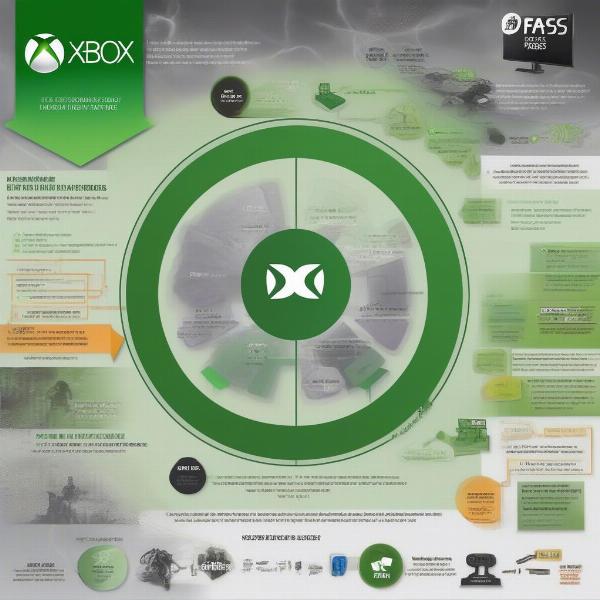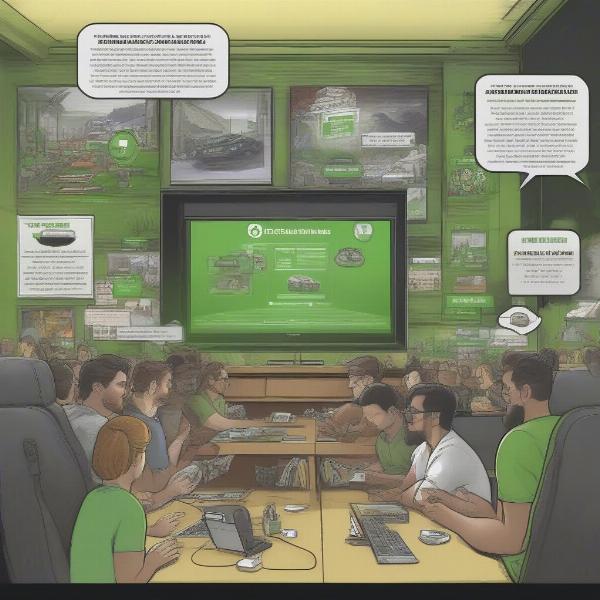The Xbox Game Pass has become a powerhouse in the gaming world, offering a vast library of titles for a monthly fee. However, its impact on the industry has drawn the attention of regulatory bodies. Here at SupremeDuelist.blog, we delve into the intricacies of the recent Federal Trade Commission (FTC) response regarding Xbox Game Pass and what it means for gamers and the future of gaming subscriptions. This analysis will explore the key points of the FTC’s concerns, Microsoft’s rebuttals, and the potential ramifications for the gaming landscape.
The FTC’s response to the Xbox Game Pass revolves around potential anti-competitive practices. Their primary focus has been on Microsoft’s acquisition of Activision Blizzard, raising questions about how this massive deal could impact competition within the gaming market, specifically concerning game access through the Game Pass service. We’ll break down the complex issues at play and provide a clear picture of what the FTC is alleging and what it could mean for you as a gamer.
Understanding the FTC’s Concerns about Xbox Game Pass
The core of the FTC’s argument centers on whether Microsoft’s control over both a major gaming platform (Xbox) and a significant number of game developers and publishers could lead to unfair advantages. The FTC fears that Microsoft could potentially make it difficult for competitors to access popular titles, thereby creating a monopoly. Essentially, they believe that Microsoft could use its power to effectively lock games within the Xbox ecosystem, thereby making it difficult for other platforms to compete.
The agency’s concern is that this could hurt consumers long term by limiting choice and potentially raising prices. The central question revolves around whether Microsoft’s strategy of adding blockbuster games to Game Pass creates a competitive disadvantage for other cloud gaming services or other subscription models, forcing other companies to expend unreasonable resources to compete. This debate has implications for the entire gaming industry, shaping the way games are distributed and accessed.
Key Points of the FTC’s Opposition
- Concerns about Exclusivity: The FTC worries that Microsoft could withhold popular Activision Blizzard titles (like Call of Duty) from competing consoles and subscription services, funneling players into the Xbox ecosystem and making Game Pass the only viable subscription service.
- Impact on Cloud Gaming: The FTC is carefully examining whether the acquisition would give Microsoft an unfair advantage in the rapidly developing cloud gaming market, where subscribers access games over the internet rather than owning physical copies or digital downloads.
- Potential for Market Consolidation: The fear is that the acquisition could lead to further industry consolidation, creating a few mega-corporations that control the majority of game development and distribution. This would dramatically reduce competition and potentially decrease the innovation within the game industry.
 ftc concerns xbox game pass acquisition
ftc concerns xbox game pass acquisition
Microsoft’s Rebuttal and Defense of Game Pass
Microsoft has vehemently denied the FTC’s claims, arguing that the acquisition of Activision Blizzard and the growth of Xbox Game Pass actually benefit consumers. The company argues that providing access to more games for a lower price is fundamentally pro-consumer, and they’ve consistently stated they intend to keep popular titles available on multiple platforms. Microsoft contends that their business strategy is to expand access to games, not limit it.
The company has also emphasized its commitment to keeping franchises like Call of Duty multi-platform, addressing one of the FTC’s main concerns directly. Microsoft aims to show that the acquisition will lead to greater availability of games on a broader range of devices and platforms, countering claims of creating a closed ecosystem. They also have stated the intention to expand competition and not diminish it within the gaming industry.
Core Arguments from Microsoft
- Pro-Consumer Approach: Microsoft highlights that Game Pass is about making games more accessible and affordable, arguing that this benefits gamers by offering a cost-effective way to explore a wide range of titles.
- Commitment to Multi-Platform: Microsoft has repeatedly emphasized its desire to keep key franchises available on various platforms, both current consoles and for cloud access.
- Boosting Competition: Microsoft claims that by adding more games to the Game Pass service, they are forcing competitors to innovate and offer better deals, which benefits the entire consumer base.
“Our goal is to bring games to more people on more devices, not to lock games away on specific platforms,” states Sarah Chen, a seasoned legal analyst specializing in tech mergers. “This is a recurring theme in Microsoft’s defense of their acquisition of Activision Blizzard.”
What Does This Mean for Gamers?
The FTC’s investigation and Microsoft’s response have raised some crucial questions for gamers. The outcome of this regulatory scrutiny could reshape how we access and play games in the years to come. For now, we continue to see an expansion of games offered on the Game Pass as the case unfolds.
For those who have embraced the Game Pass subscription, this debate is an interesting one. If Microsoft continues to grow its library and keep those games on the subscription service without raising the price, the consumer wins. However, a negative ruling could lead to a restructuring of Microsoft’s gaming strategy. It is important to note that the outcome of this could also influence the overall gaming industry.
Potential Outcomes
- Increased Competition: A positive resolution for Microsoft could encourage further growth in subscription services and cloud gaming.
- Regulation of Gaming Industry: Stricter regulations on game acquisitions and exclusivity could potentially arise based on how the rulings of the case go.
- No Change for the Consumer: It’s possible that, regardless of the legal outcome, gamers could see very little change to how they already access and experience games. It depends greatly on the final agreements that are reached.
 future gaming landscape xbox game pass
future gaming landscape xbox game pass
The Future of Gaming Subscriptions
The Xbox Game Pass Ftc Response is not just about one specific service or acquisition; it’s about the future of gaming subscriptions as a whole. The outcome of this case could set precedents for how similar platforms operate and will have a large impact on other game companies. The focus is on how fair is it to lock consumers into one platform and subscription service.
The FTC’s concerns reflect a broader debate on how to balance industry growth with consumer protection. The gaming industry is rapidly evolving, and regulatory bodies are trying to keep pace with these developments. This process is likely to be an ongoing one as new technology and game business models emerge over time.
The Broader Impact
- Precedent for Future Mergers: The FTC’s ruling will influence how future game industry acquisitions are handled, potentially shaping how large companies operate.
- Impact on cloud gaming services: Other platforms will be looking closely at what is happening to help plan for their own subscription-based services.
- Evolving Business Models: This regulatory challenge could lead to innovative and balanced game distribution models.
“The scrutiny that Xbox Game Pass is facing now isn’t unique,” explains gaming law expert Michael Ramirez. “It’s part of a broader trend of regulators taking a closer look at tech acquisitions and their potential impact on market competition.”
Frequently Asked Questions about the Xbox Game Pass FTC Response
What exactly is the FTC’s concern about the Xbox Game Pass?
The FTC is worried that Microsoft’s acquisition of Activision Blizzard and the growing power of Xbox Game Pass could give them an unfair advantage, limiting competition and potentially harming consumers through fewer choices and higher prices.
How is Microsoft defending its position regarding the Game Pass?
Microsoft argues that Game Pass is pro-consumer, offering affordable access to many games. They insist they are committed to multi-platform availability and that their model promotes competition, as opposed to hindering it.
What are some of the potential outcomes of the FTC’s investigation?
The outcome could range from increased competition and regulation of the gaming industry to limited change for gamers. It’s also possible that the case could lead to restructuring of Microsoft’s gaming strategy.
How might this affect other subscription services in the gaming world?
This case could set precedents for other game subscription platforms, shaping how they operate and handle competition, leading to new rules that all platforms have to follow.
Will this ruling influence cloud gaming?
Yes, the ruling could have a significant impact on cloud gaming, potentially determining who has an advantage in the growing market.
Conclusion
The Xbox Game Pass FTC response is a complex issue with far-reaching implications. It’s a situation that warrants continuous analysis and careful observation. Here at SupremeDuelist.blog, we strive to give you the best information possible. The case underscores the need for careful regulation and the need for a balance between innovation and consumer protection. Whether the outcome is a continuation of the subscription model we have come to know, or a new gaming landscape, we will be here to help you navigate it. We will continue to monitor and report on how this case unfolds, providing you with up-to-date information and analysis.
Stay tuned to SupremeDuelist.blog for more insights into the ever-evolving world of gaming. We always strive to bring you the most relevant information in the industry, helping you make informed decisions about gaming.
Leave a Reply